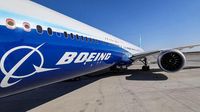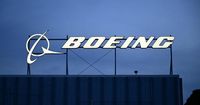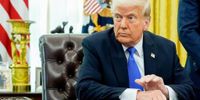In a significant escalation of trade tensions between the United States and China, the Chinese government has ordered domestic airlines to halt deliveries of Boeing jets. This directive comes as a direct response to the U.S. imposing steep tariffs on Chinese goods, which have reached as high as 145%. The situation has drawn the attention of President Donald Trump, with Bank of America (BofA) asserting that this ban on Boeing deliveries has compelled the administration to take notice of the aircraft manufacturer.
According to a report by Bloomberg News, the Chinese government instructed its airlines to stop accepting Boeing aircraft, as well as to cease purchases of airline parts and components from U.S. companies. This move represents a significant blow to Boeing, which has been a major player in the aviation market, particularly in China, where it has long sought to expand its footprint.
Boeing's shares took a hit in morning trading on April 15, 2025, dropping by $2.59, or 1.6%, to $156.74. The company's stock performance reflects investor concerns over the implications of the trade war and the impact of China's retaliatory measures. The order to stop accepting deliveries comes after China raised its tariffs on U.S. goods to 125%, effectively doubling the cost of U.S.-made aircraft and parts, making them prohibitively expensive for Chinese airlines.
As part of this escalating trade conflict, Boeing was scheduled to ship approximately 10 737 Max aircraft to several Chinese carriers, including China Southern Airlines, Air China, and Xiamen Airlines. These deliveries were part of a larger strategy in which Boeing aimed to capitalize on the growing demand for air travel in China. In the first quarter of 2025 alone, Boeing reported delivering 130 aircraft globally, including over 100 737 jets.
President Trump addressed the situation in a post on Truth Social, stating that China “just reneged on the big Boeing deal, saying that they will 'not take possession' of fully committed to aircraft.” This statement underscores the heightened tensions as both nations grapple with the repercussions of their trade policies. Although some payment and delivery paperwork for the jets ordered by Chinese airlines may have been completed before the trade war intensified, the future of these aircraft remains uncertain.
In light of the new tariffs, the aviation giant has found itself at a crossroads. Boeing considers itself a top U.S. exporter, serving customers in over 150 countries, but the current climate raises questions about its ability to maintain its market share in China, particularly as rival Airbus continues to dominate.
Chinese airlines have been instructed to halt further deliveries of Boeing aircraft in response to the U.S. tariffs, which has led to a significant drop in Boeing's stock price. Just before 7 a.m. EST on April 15, Boeing's pre-market share price was down 3.72%. The company reported that it had delivered 18 aircraft to nine airlines in China year-to-date, but the new restrictions threaten to disrupt these operations.
Air China, China Eastern Airlines, and China Southern Airlines had plans to take delivery of 45, 53, and 81 Boeing planes, respectively, between 2025 and 2027. However, with the new tariffs in place, the cost of these jets is expected to rise dramatically, prompting airlines to reconsider their options. A 125% duty would significantly increase the expenses associated with acquiring Boeing jets, potentially pushing airlines to explore alternatives, such as Airbus or domestic manufacturer COMAC.
Despite these challenges, there are reports that the Chinese government is considering ways to assist airlines that lease Boeing jets and face escalating costs. This potential support reflects the complexities of the situation, as both nations navigate the turbulent waters of international trade.
As the U.S. and China continue to engage in a tariff war, the implications for Boeing and the broader aviation industry are profound. The Trump administration's trade policies have led to a significant shift in the dynamics of U.S.-China relations, with both sides taking increasingly aggressive stances. While President Trump has expressed a willingness to negotiate, no agreement has been reached as of yet.
In conclusion, the trade conflict between the U.S. and China has reached a critical juncture, with Boeing caught in the crossfire. The company's future in the Chinese market hangs in the balance as it grapples with the consequences of rising tariffs and halted deliveries. As tensions escalate, the aviation giant will need to adapt quickly to survive in an increasingly competitive landscape.






